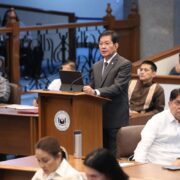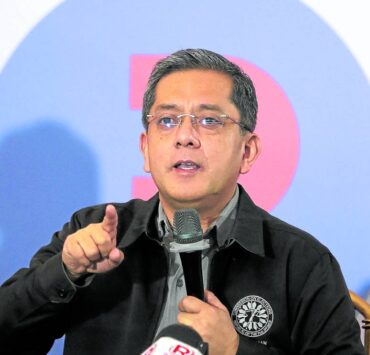Civilian groups fill gaps in WPS response

Filipino fisherfolk remain vulnerable to harassment and economic hardship, nine years after the 2016 arbitral ruling that invalidated China’s claims to the West Philippine Sea (WPS).
But a rising wave of civilian initiatives is filling the gaps left by limited government capacity in asserting the country’s sovereign rights in the WPS.
“Has the legal victory translated into meaningful change on the ground? From an anecdotal and sectoral standpoint, some improvements are emerging, but for the most part, our fisherfolk are still waiting to feel its full impact,” Atin Ito Coalition coconvenor Edicio Dela Torre told the Inquirer on Wednesday.
The coalition, whose name translates to “this is ours,” is composed of fishermen, activists and concerned Filipinos. Its activities are not officially endorsed by the Philippine government but are seen as a form of citizen-led resistance against China’s encroachment on Philippine territory and resources. Its actions are also intended to challenge China’s sweeping maritime claims.
In a statement on Saturday marking the ninth anniversary of the ruling, the Department of Foreign Affairs (DFA) said the 2016 arbitral award remains a cornerstone of the country’s maritime policy and its pursuit of a rules-based order.
‘Rightfully ours’
“The Filipino nation will always look to the enduring guidance of the 2016 Arbitral Award on the South China Sea in asserting its rights and entitlements in its maritime domain and in protecting its sovereignty, sovereign rights, and jurisdiction,” it said.
The ruling, handed down by the arbitral tribunal in The Hague on July 12, 2016, rejected Beijing’s expansive nine-dash-line claim, recognizing Philippine sovereign rights within its exclusive economic zone.
The Armed Forces of the Philippines also reaffirmed its commitment to uphold those rights.
“This is more than a legal ruling but a recognition of what every Filipino has long held in their heart—that these waters, resources, and legacy—are rightfully ours,” said AFP chief of staff Gen. Romeo Brawner Jr.
“The West Philippine Sea is not just a line on a map. It is a lifeline. It feeds our people, secures our borders and speaks of our dignity as a nation,” he added.
Amid these commitments, China has continued its aggressive actions, often blocking access even 30 kilometers out of Panatag (Scarborough) Shoal.
Dela Torre said small-scale fishermen are the most affected as their boats could not travel far and were forced to rely on larger “pangulo,” or mother boats. The main vessels, in turn, use “payaos,” or aggregation devices to harvest fish.
“Even these payaos are endangered because they can be cut or destroyed (by the Chinese),” he said. “Definitely there is increased presence and aggressive actions.
They may not be as dramatic as water cannoning or ramming, but they are real. Government vessels like the [Bureau of Fisheries and Aquatic Resources] are usually targeted, but even small and commercial fishers feel the effects.”
He noted a shift, however, in the level of public attention and support: “At least now, because of the arbitral ruling, the response to Chinese harassment, and campaigns like Atin Ito, there’s government protection through BFAR, and more people are aware of our fisherfolk’s problems.”
Growing support
Dela Torre cited the support they had received not only from civic groups like Rotary Clubs, but also from local government units that were previously passive.
Atin Ito has also partnered with schools like Miriam College and Ateneo de Manila University to promote awareness and raise funds for new payaos.
Asked if the national government is doing enough for such advocacy, he replied, “It’s a start. Definitely lacking. But to put it in perspective, at least compared to before, there’s more attention now. In the previous administration, they wouldn’t even publicize these issues.”
He added: “If you don’t fight, you will be oppressed. If you fight, you will still be oppressed—it’s better to be oppressed while you’re fighting than to just give in and be angry.”
But Dela Torre cautioned against militarizing the issue; it should be “civilianized” instead.
At the House of Representatives, ML Rep. Leila de Lima called for a more assertive response to China’s aggression, including passing laws translating the arbitral ruling into concrete policies through education reforms, civic commemorations and a review of Philippine ties with Chinese local governments.
Lawmakers who dub themselves the “WPS bloc” filed several measures on July 9, including a bill mandating the integration of the history and legal basis of Philippine sovereign rights the WPS into the basic education curriculum.
“These measures represent a new, impactful phase in our struggle, one that is legislative, educational, and unapologetically assertive,” De Lima said.
“It’s time for our laws to serve as weapons, not just as a line of defense,” she added.
But while legal and diplomatic victories remain crucial, Dela Torre emphasized the importance of translating them into real benefits for Filipinos. “The arbitral ruling gave governments the incentive and confidence to give support to the Philippine cause. This isn’t just about Philippine interests—it’s about freedom of navigation and trade in the region,” he said.
Atin Ito continues to hold concerts and forums in partnership with academic institutions for the campaign.
“The positive thing now is that more people are finally noticing. The fisherfolk used to suffer in silence. Now the problems are better known, and more groups—even local governments—are beginning to help,” he added.

















